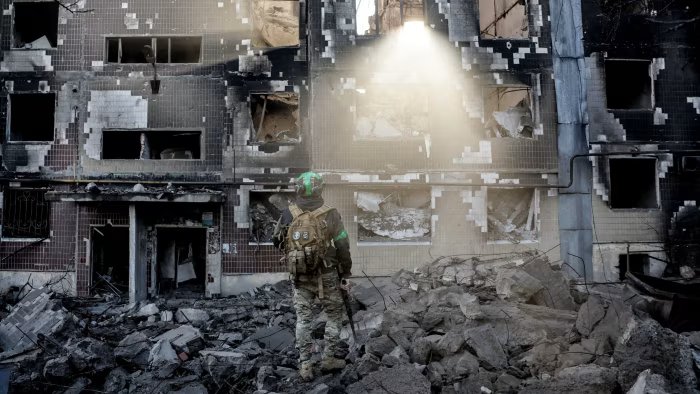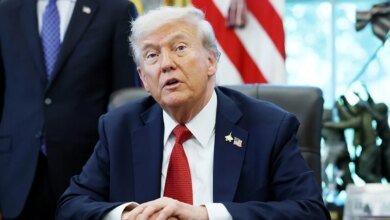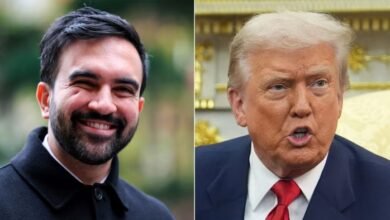Europe races to respond to US-Russian Ukraine peace plan

Open the White House Watch newsletter for free
Your guide to what Trump’s second term means for Washington, business, and the world
European capitals are rushing to coordinate a response to avert a US-Russian peace plan to end the war in Ukraine, which officials have warned would mean Kiev “surrendering” to Moscow’s demands.
Washington is pressuring Ukraine to accept a 28-point peace plan drawn up by aides to US president Donald Trump and Russian President Vladimir Putin, which calls on Kiev to cede areas of territory currently under its control.
It includes more major concessions to Moscow, including a ban on any future membership of Ukraine in NATO.
In a joint statement with Ukrainian President Volodymyr Zelensky on Friday, the leaders of France, Germany and the United Kingdom appeared to contradict parts of the US-Russian proposal.
European leaders insisted that the current frontline between Ukraine-controlled territories and Russia must be “a starting point for any understanding and that the Ukrainian armed forces remain able to effectively defend Ukraine’s sovereignty.”
These comments came after a phone call between Zelensky, French President Emmanuel Macron, German Chancellor Friedrich Merz, and British Prime Minister Sir Keir Starmer.
The statement added that any peace settlement “requires the consent of European partners or the consensus of allies” and welcomed “US efforts to end the war in Ukraine” but also promised to “continue to pursue the goal of protecting vital European and Ukrainian interests in the long term.”
The leaders’ call is scheduled to be followed by personal meetings between leaders at the G20 summit in Johannesburg to formulate a response. It came as European capitals reeled from shock over the plan and the scale of US pressure on Ukraine to approve it, according to people involved in the frenetic diplomatic talks.
“We’re all still analyzing it, but it’s moving much faster than we realized,” one person said. “It basically means surrender.”
Three senior European officials said they were still unsure whether Trump fully supported the plan or whether it was subject to internal disagreement within his administration.
“We are back to square one,” another senior European official said, referring to widespread concerns at the beginning of this year that Trump might force Kiev to accept Russian peace demands or lose American military support.
European officials have been alarmed not only by proposals to recognize the Ukrainian territories of Crimea, Luhansk and Donetsk as “de facto Russian,” but also by a proposed ban on NATO forces in Ukraine and a push to deploy $100 billion in frozen Russian sovereign assets in reconstruction projects that benefit the United States.
Under the plan, US sanctions will be lifted in agreed stages and Moscow will be invited to rejoin the Group of Eight major industrialized nations, ending years of international isolation following its large-scale invasion of Ukraine in 2022 and forced annexation of Crimea in 2014.
Antonio Costa, president of the European Union Council which represents the bloc’s 27 leaders, said “nothing has been reported.” [peace] Plans in a formal way.”
The US Embassy in Kiev summoned European envoys to the Ukrainian capital to brief them on the plan on Friday afternoon with US Army Secretary Daniel Driscoll. Driscoll met with Zelensky on Thursday to put forward the proposal.
The panic among European capitals is similar to previous events earlier this year where the Trump administration made proposals for Ukraine without consulting or notifying European partners.
“The Europeans have become incredibly complacent in their dealings with the Trump administration,” said Mujtaba Rahman, managing director of Eurasia Group. “This latest plan is a timely reminder that there are very powerful forces within the administration who continue to prioritize Russia over transatlantic relations.”
Another senior European diplomat said: “We are assessing. The main thing is to remain calm and work towards a more logical outcome.”
Speaking at the G20, European Commission President Ursula von der Leyen said, “There is nothing about Ukraine without Ukraine,” reiterating a longstanding EU position on peace negotiations.
Prices for Ukraine’s distressed dollar bonds due in 2035 rose 1.5 cents to more than 52 cents on the dollar, thanks to bets that an early end to the war would increase the chances of their repayment.
The debt has risen by 10 percent in the past three trading days due to reports of the US-Russian peace plan.
European defense stocks, which have risen this year as the continent increases its spending commitments, fell on Friday, with the STOXX 600 aerospace and defense sector index falling 2.7 percent.
Rheinmetall shares fell more than 5 percent, while Rinke Group, a German manufacturer of engines and military vehicle systems, fell 8.5 percent.
Oil prices also fell, with Brent crude falling to $62.34 per barrel.
Additional reporting by Ben Hall, Emily Herbert, Anna Gross and Fabrice Deprez
2025-11-21 12:13:00




